Samsung Galaxy Watch 5 Pro vs. Apple Watch Ultra: Which flagship watch is best?
An expensive lifestyle watch against an exorbitant, rugged fitness watch.
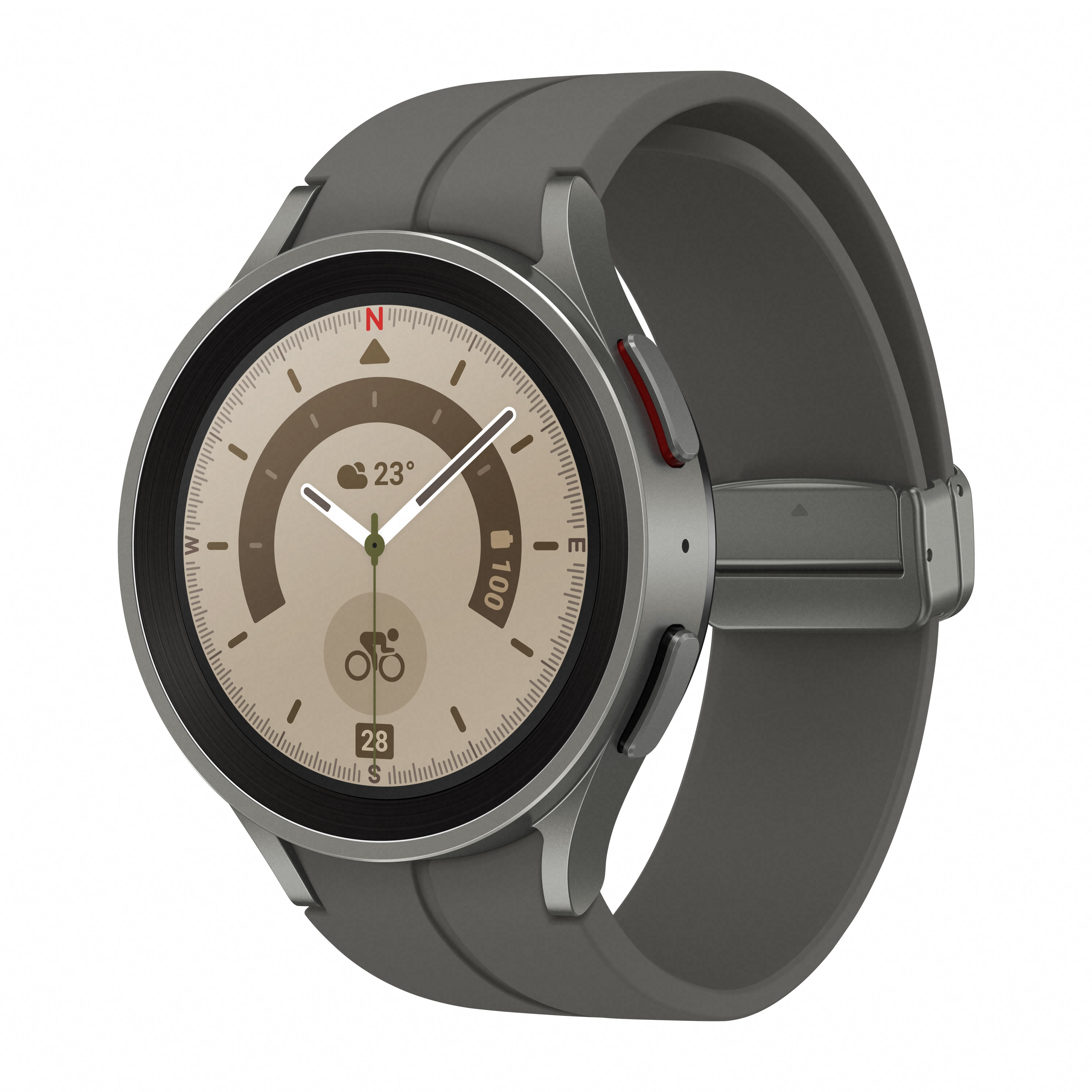
Premium Android watch
Samsung makes the best smartwatches that Android users can buy, and the Galaxy Watch 5 Pro targets hardcore users who want multi-day battery life per charge, or to safely use features like music streaming and always-listening Google Assistant without the battery dying in a few hours.
For
- 3-day battery life
- Google Assistant support
- Offline GPX maps
- Body composition data
- Lighter than the Ultra
Against
- Samsung Health somewhat limited for fitness
- Only 16GB of storage
- Temperature sensor isn't active yet
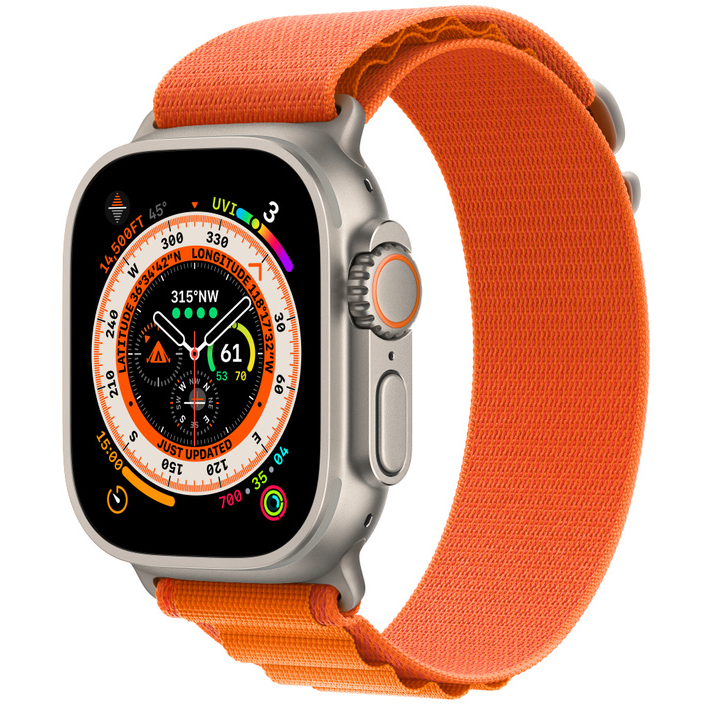
Premium fitness watch
$800 for a smartwatch?! Apple did its best to justify paying double for its superpowered watch by making it a rugged, powerful behemoth. It balances lifestyle and fitness features well, so anyone from a climbing pro to a work-at-home type will benefit from it.
For
- 1.9-inch, 2,000-nit display
- Crown better than digital bezel for fitness
- Active temperature sensor
- Dual-frequency GPS tracking
- Better for water sports
- Cellular data built-in
Against
- Painfully expensive
- Too large or heavy for some wrists
- No offline maps
Both the Apple Watch Ultra and Galaxy Watch 5 Pro are the first of their kind. Apple had never before produced a premium flagship watch targeting serious athletes before; Samsung had made "Active" watches, but never such a massive "Pro" model with such long battery life before. But are either of them worth buying?
To spoil the conclusion a bit, the Apple Watch Ultra is the "better" watch of the two, but that's to be expected when it costs nearly twice as much. Apple packed it with a ton of exclusive tools that make it well-suited for outdoorsy folks, while also giving it perks that sedentary users will enjoy — but at an eye-watering price. The Galaxy Watch 5 Pro, too, is very expensive but doesn't have quite the same exclusivity of features compared to the Galaxy Watch 5.
With all that preamble out of the way, let's explore how the Samsung Galaxy Watch 5 Pro vs. Apple Watch Ultra comparison shakes out, and which watch is the better purchase for you.
Samsung Galaxy Watch 5 Pro vs. Apple Watch Ultra: Design, display, and bands
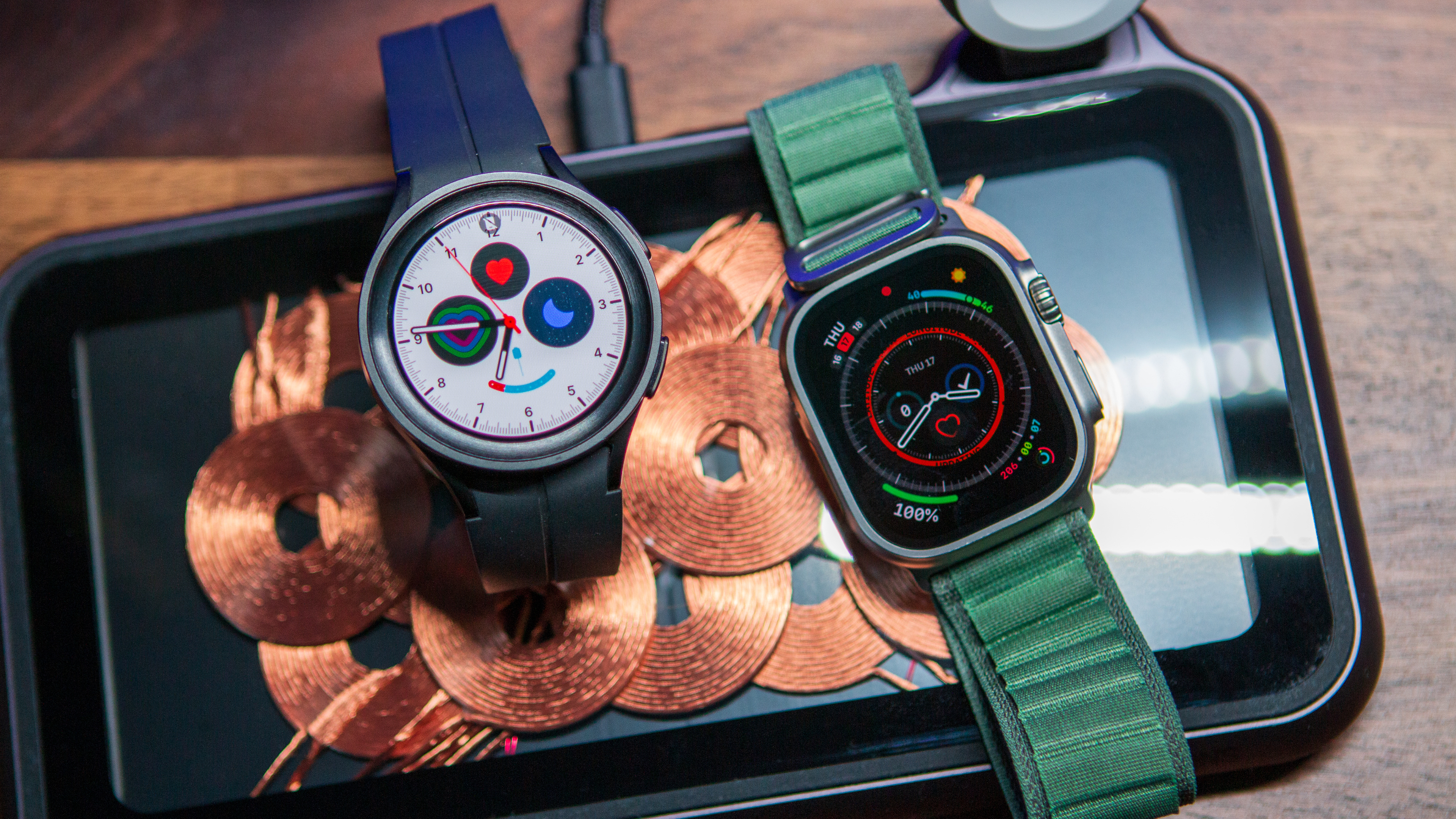
Both of these watches could easily be described as too large and heavy depending on your wrist size and preferences. Certainly, if you compare the snug, skinny Apple Watch 8 against the Ultra, or the Galaxy Watch 5 against the Pro, the larger watches lose that sleek appeal for a more rugged design.
Both watches have a titanium case, sapphire glass, and a raised bezel that protects the display during falls. Both are IP6X dust-proof and have MIL-STD-810H protection, though only Apple has specified that the watch has been tested for Altitude, High Temperature, Low Temperature, Temperature Shock, Immersion, Freeze/Thaw, Shock, and Vibration.
The Galaxy Watch 5 Pro is the only watch with an official IPX8 water resistance rating, along with 5ATM (50 meter) water resistance. But the Apple Watch Ultra has a WR100 rating (aka 100 meters) and has been approved for scuba diving down to 40 meters and "high-speed water sports," plus a EN 13319 rating that makes it fully approved for divers.
Most water-resistant devices aren't actually prepared for situations where water could impact the device at high speeds, so the Apple Watch Ultra is the superior option for fans of swimming, diving, and other water sports — even if the Galaxy Watch 5 Pro works perfectly well for casual pool use.
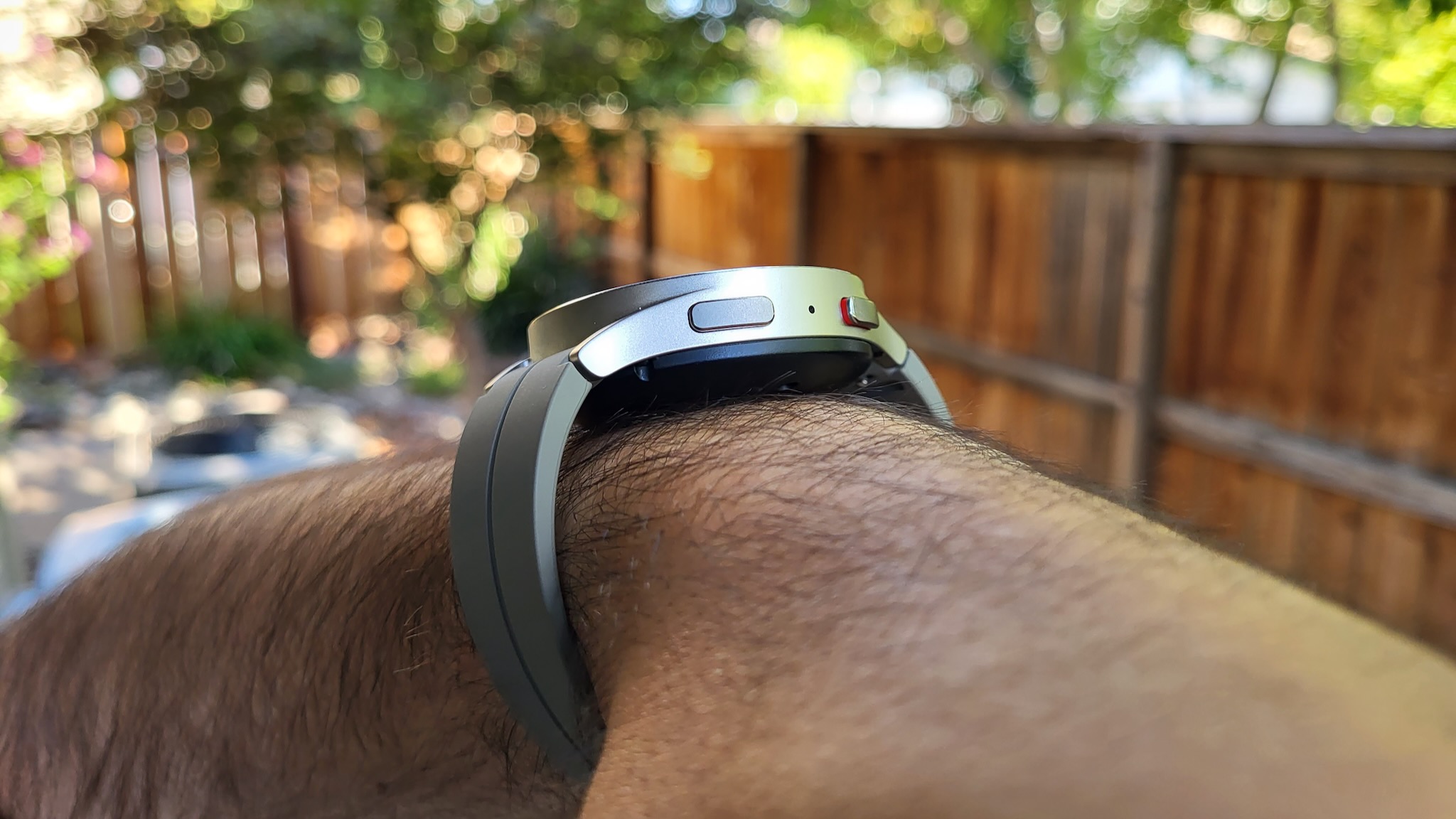
Unlike the Galaxy Watch 4 Classic, the Galaxy Watch 5 Pro has no physically rotating bezel, which made it easy to scroll through menus and gave the watch a classic look. The Watch 5 Pro relies on a digital touch bezel around the edge of the 1.4-inch display, so you can scroll through options by sliding your finger in a circle. You also have two dedicated side buttons for selecting or backing out, as well as double-tap or long-press shortcuts like pulling up Google Assistant or Google Wallet.
The Apple Watch Ultra, like all Apple Watches, has a Digital Crown, but it's been redesigned with a larger diameter and coarser grooves that our iMore colleagues have said makes it far easier to use than the standard, petite crown. It also has a new, bright-orange Action Button in addition to the back button, which can be set up for any custom shortcut like starting a workout or turning on the flashlight feature.
When it comes to an actual workout, we much prefer having the crown for navigating through menus to trying to swipe or scroll through them with sweaty fingertips on the Galaxy Watch 5 Pro, something our reviewer noted could be "annoying as heck" to deal with.
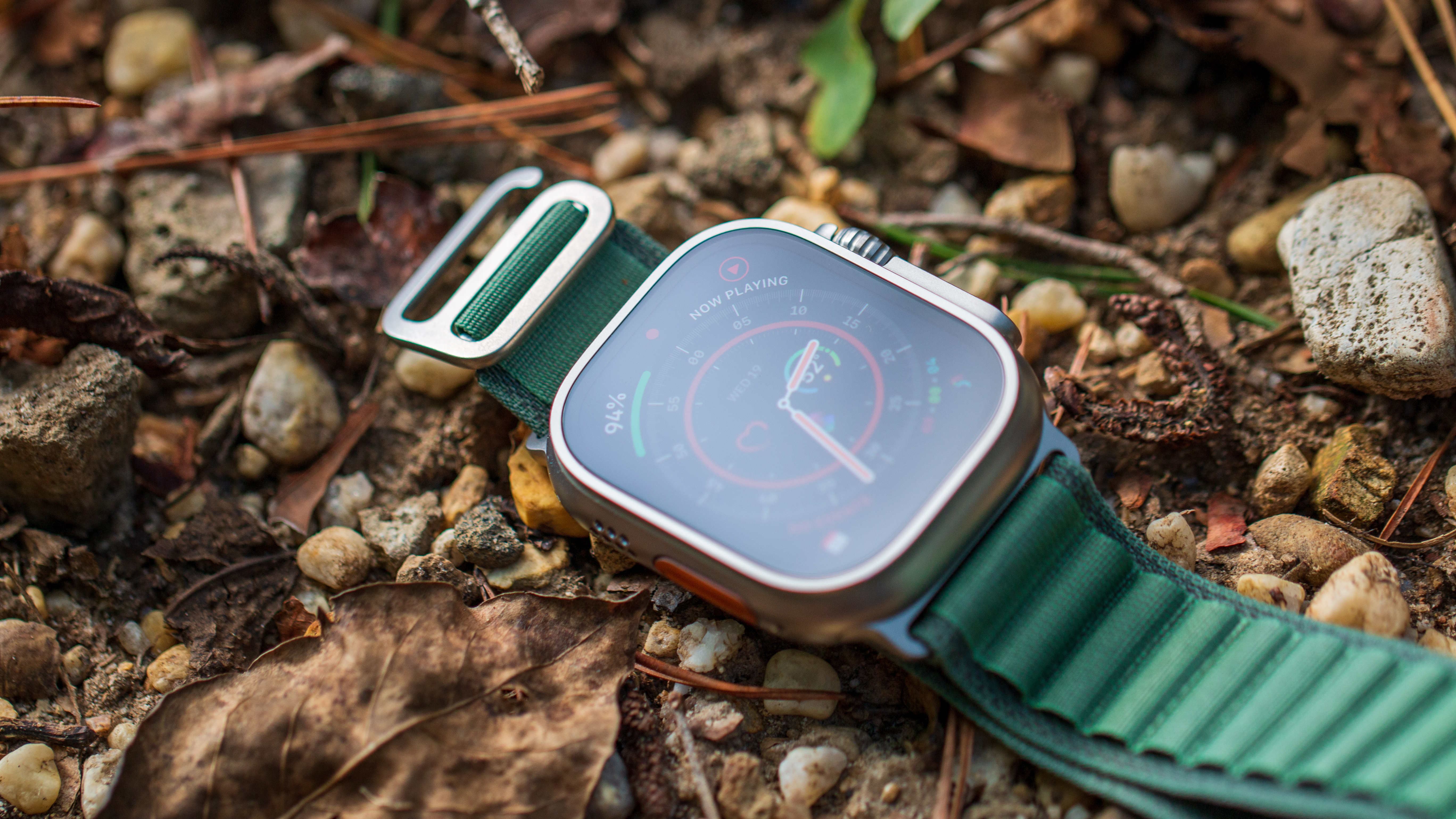
Both watches have large displays, but the 1.9-inch Apple Watch Ultra does give you more overall space than the 1.4-inch Galaxy Watch 5 Pro, and 17 more pixels per inch (ppi), too. The square shape means that the Ultra is less likely to cut off text at the corners. In addition, the Galaxy Watch 5 Pro gives you a respectable 1,000 nits of brightness, but the Ultra doubles up to 2,000.
For call quality, the Apple Watch Ultra has a three-microphone array with beamforming and wind noise mitigation, plus a dual-speaker system that gives it plenty of volume for loud environments. For comparison, we'd call the Galaxy Watch 5 Pro pretty standard when it comes to its mic and speaker.
The Apple Watch Ultra has several advantages over the Galaxy Watch 5 Pro in its design, but it is the heavier of the two, weighing about 15g/0.5oz more without taking the band into account. The Pro's default magnetic D-Buckle Sport band is quite heavy — you may want to consider other Galaxy Watch 5 Pro bands instead — while the Ultra's Trail and Alpine Loops are allegedly a bit lighter, so that may close the gap a bit.
Both of these watches are heavier than almost anything else on the market today, making them ill-suited for sleep tracking — which about two-thirds of our readers use. But for everyday use, they're comfortable enough if you have medium-to-large wrists.
Samsung Galaxy Watch 5 Pro vs. Apple Watch Ultra: Hardware and battery life
| Category | Samsung Galaxy Watch 5 Pro | Apple Watch Ultra |
|---|---|---|
| Display | 1.4″ Super AMOLED (450x450, 321ppi) | 1.92-inch (502x410, 338ppi) |
| Brightness | Up to 1,000 nits | Up to 2,000 nits |
| Material | Titanium | Titanium |
| Bands | Ridge-Sport, D-Buckle Sport, Global Goals, Sport, Extreme Sport, Hybrid Leather | Alpine Loop, Trail Loop, Ocean Band |
| Navigation | Touchscreen, two buttons, digital bezel | Touchscreen, rotating crown, two buttons |
| Processor | Exynos W920 | Apple S8 |
| Memory | 16GB; 1.5GB RAM | 32GB |
| Battery | 590mAh; Up to 80 hours | 542mAh; Up to 36 hours |
| Wireless charging | Yes (Qi) | Yes (proprietary) |
| Connectivity | Bluetooth 5.2, Wi-Fi 802.11 a/b/g/n 2.4+5GHz, NFC, GPS/Glonass/Beidou/Galileo, LTE (optional) | LTE (included), Dual-band GPS, GLONASS, GALILEO, BDS, Bluetooth 5.3, Wi-Fi, NFC, Ultra wideband |
| Sensors | Samsung BioActive Sensor (Optical Heart Rate + Electrical Heart Signal + Bioelectrical Impedance Analysis), Temperature Sensor, Accelerometer, Barometer, Gyro Sensor, Geomagnetic Sensor, Light Sensor | Accelerometer, ambient light, barometer/altimeter, compass, ECG, gyroscope, heart rate monitor, pulse oximeter, thermometer |
| Compatibility | Android (Google Assistant, Bixby) | iOS (Siri) |
| Protection | 5ATM, IP68, MIL-STD-810H | IP6X, MIL-STD-810H, 10ATM |
| Dimensions | 45.4 x 45.4 x 15mm | 49 x 44 x 14.4mm |
| Weight | 46.5g (without strap) | 61.3g (without strap) |
Another similarity between these two watches: both used the same chipset found in their cheaper and older siblings, but both have speedy performance in spite of this.
Samsung used the Exynos W920 chip found in the Galaxy Watch 5 and Galaxy Watch 4, paired with a respectable 1.5GB of RAM. For context, most Android watches have just 1GB of RAM, with only the Pixel Watch beating it with 2GB. Our reviewer said this is enough to give you an "immediate response to any tap or swipe," with no issues with performance or loading times.
The Apple Watch Ultra has a "new" Apple S8 chip which is essentially no different from the S7 found in the Apple Watch Series 7, but the new flagship watch is just as fast and fluid as the rest of the lineup. We don't have benchmarks to compare its speed with the Galaxy Watch 5 Pro, so let's simply settle to say that both are excellent in this category.
One thing you will appreciate about the Apple Watch Ultra is that it has double the storage space for apps and music at 32GB, making the Galaxy Watch 5 Pro's 16GB look a bit paltry by comparison.
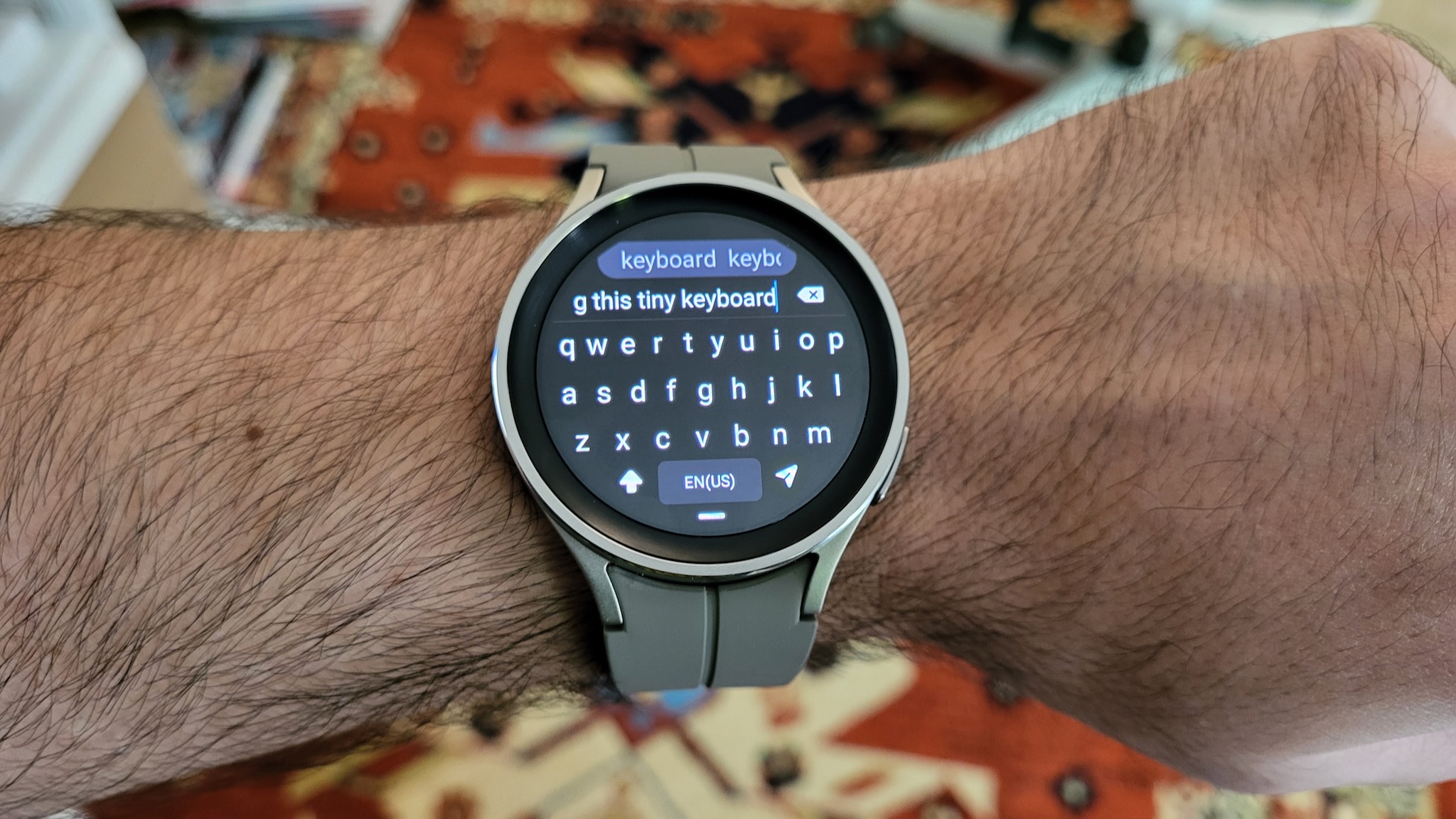
Where the Galaxy Watch 5 Pro clearly wins is in battery life. Samsung gave it an 80-hour estimate per charge, and that's pretty accurate from our tests for standard usage. If you activate continuous heart rate and blood oxygen monitoring with sleep tracking, it lasts about three days; add in the always-on display, music streaming, always-listening Google Assistant, and GPS tracking, and it'll be closer to 24-30 hours. For most people, at least two days per charge is perfectly reasonable, or three if you only track SpO2 data at night.
The Apple Watch Ultra "only" hits 36 hours per charge, though compared to the 18-hour Apple Watch Series 8, that's pretty excellent. iMore's reviewer did manage to hit that number, and noted that a 60-hour low-power mode will be added via software update. But that number essentially means you can use the watch for a full day and night, then the following day before charging it just prior to bedtime the next day.
If you're buying this for fitness, you'll need to know how long it'll last with GPS tracking. The Apple Watch Ultra reportedly lasts 12 hours with GPS or 10 with GPS and LTE; the only complication is that the number will go down if you use dual-frequency GPS. The Galaxy Watch 5 Pro can reportedly last 20 hours with GPS connected, showing the benefit of its more robust battery.
Samsung Galaxy Watch 5 Pro vs. Apple Watch Ultra: Fitness and sensors
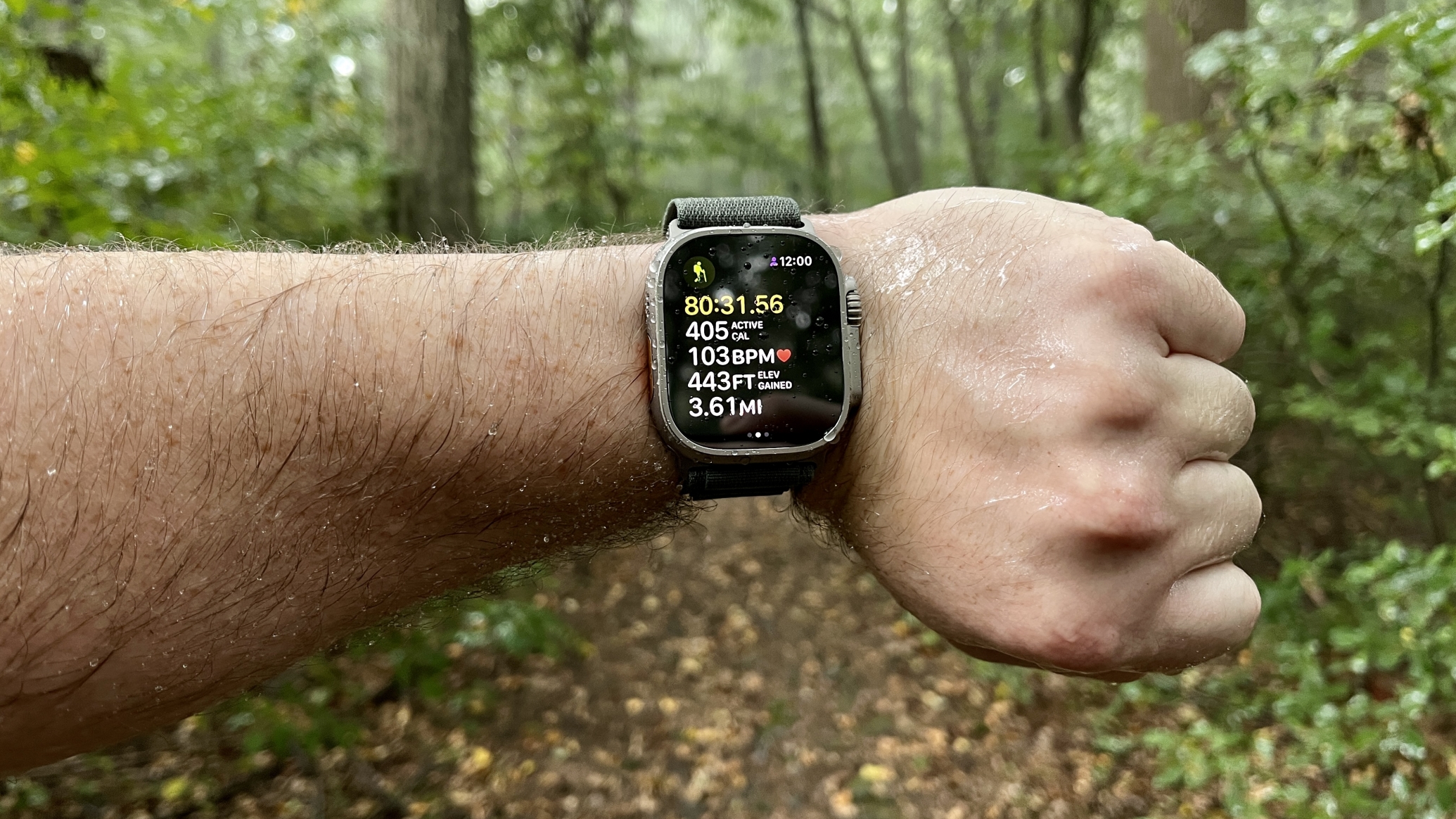
Whether you buy the Apple Watch Ultra or Galaxy Watch 5 Pro, you get an accelerometer and gyroscope for accurate wrist tracking, an altimeter to measure effort at elevation, an ambient light sensor to adjust visibility based on your surroundings, a compass to guide you in the wilderness, and all of the major GNSS tracking systems.
Only the Apple Watch Ultra has dual-frequency GPS, which means it uses both L1 and L5 satellite signals in order to have multiple angles on your position at any time; this allows your watch to better track you if you're somewhere near major obstructions like buildings, mountains, or foliage.
While we personally haven't tested this feature on Apple's watch, we've found that it had a major positive effect on accuracy on fitness watches like the Garmin Forerunner 255 and Coros Apex 2 Pro. And the Galaxy Watch 5 Pro's GPS tracking, by contrast, "frequently breaks off at odd angles when something interferes with the signal" according to our reviewer.
Apple also added better fitness tools for guided workouts thanks to the new watchOS 9. The Apple Watch Ultra can measure your heart rate zone, running power, and running form during a run, then create Custom Workouts that challenge you to run a certain distance while maintaining the right pace, heart rate, or cadence.
Samsung technically has an old "Running Coach" feature to guide you to keep a certain pace, but there are only a few fixed options. And while it does measure certain stats like cadence and heart rate zones, you can't access that data during a run. Its only major advantage is that it lets you download offline GPX maps, something the Apple Watch Ultra can't do.
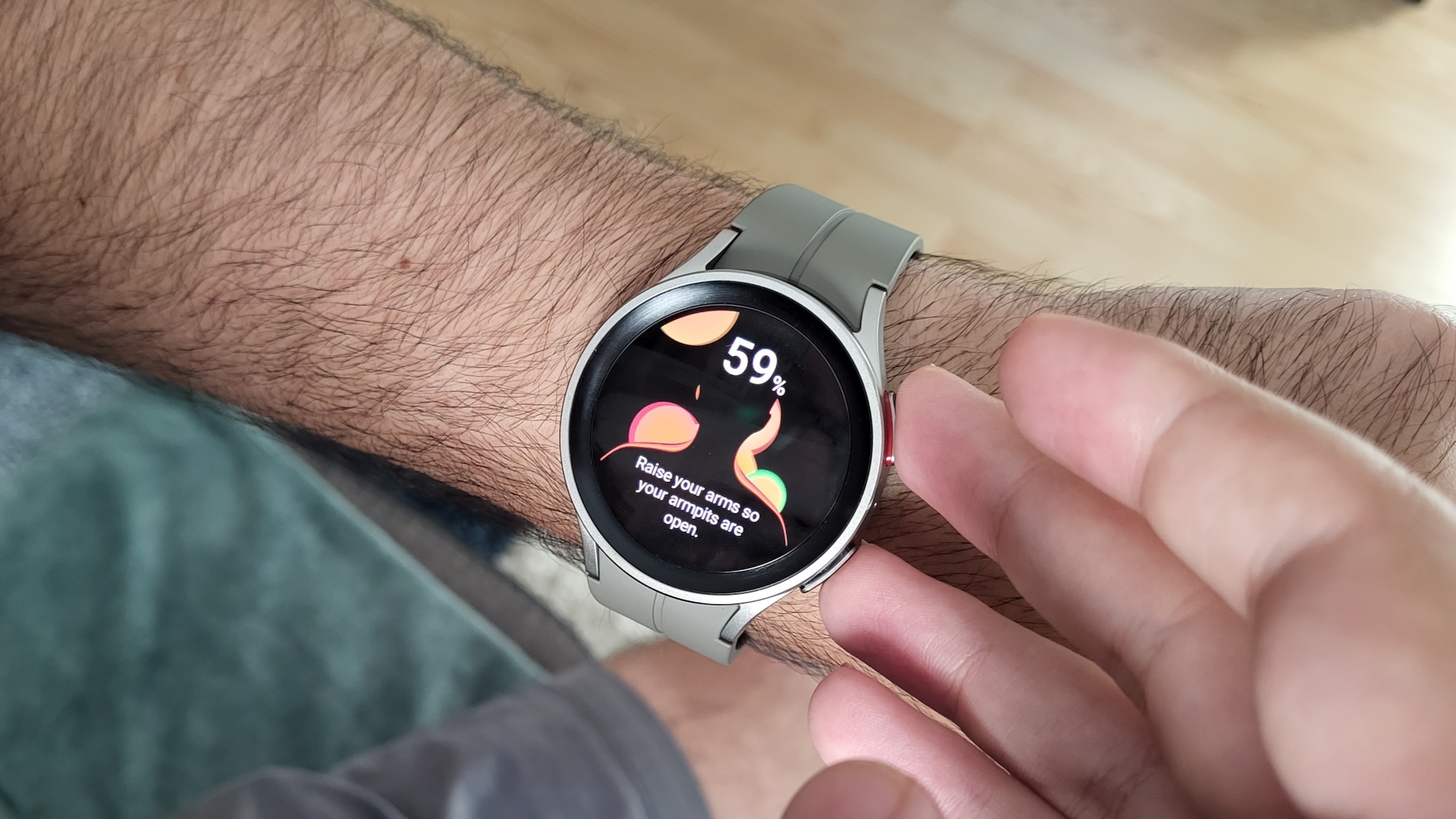
Health sensors are the other important part of the equation, and both watches sport optical heart rate monitors, a blood oxygen sensor, an electrocardiogram (ECG), and a temperature sensor — though Samsung still hasn't activated the latter several months after launch, a frustrating state of affairs.
If you're looking for exclusives, the Galaxy Watch 5 Pro has a Bioelectrical Impedance Analysis sensor that detects your body composition. You get the same data you'd normally get on a smart scale — skeletal muscle, basal metabolic rate, and body water and body fat percentage — except you only have to press your fingers on the two side buttons to detect it.
As for the Apple Watch Ultra, its familiar sensors got upgraded compared to most watches. The accelerometer detects "up to 256 g-forces with Fall Detection and Crash Detection," the "high dynamic range gyroscope" is supposedly more accurate for detecting specific motion, and the temperature sensor can detect the water temperature around you, as well as air and skin temperatures.
Samsung Galaxy Watch 5 Pro vs. Apple Watch Ultra: Which should you buy?
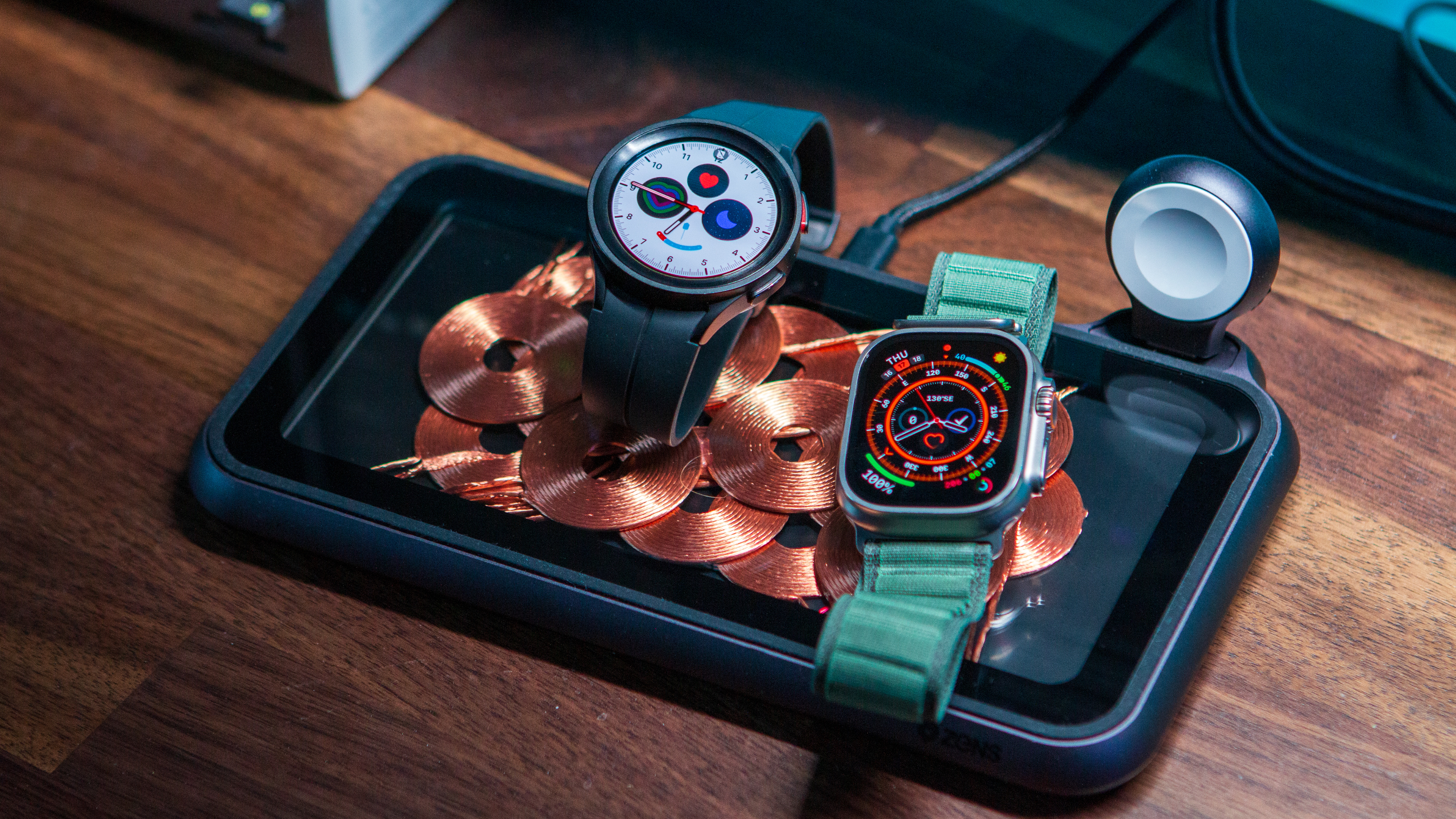
Most people stick to either iOS or Android, so in that case, you can simply choose whichever watch works with your chosen ecosystem. But if you just want to know if you're buying the best fitness smartwatch available, or might consider switching for the right phone/watch combo, then that's another discussion.
My colleague, Andrew Myrick, bought both the Galaxy Watch 5 Pro and Apple Watch Ultra out of pocket. As I could only speak to Samsung's watch (having reviewed it), I asked him which he would recommend. He told me, "ignoring price, it would be the Watch Ultra. Multi-day battery life, flat display with no bezel getting in the way." He also said that "it's impossible to recommend given the price," but that "it's easily my favorite smartwatch ever." Talk about a paradox, there!
iMore also recommended the Apple Watch Ultra in its review over the Series 8, praising all the ways it's a better device for regular users as well as serious athletes. The giant display and longer-than-usual battery life make it a compelling choice. But it's very difficult to get past the $800 price tag.
The Samsung Galaxy Watch 5 Pro, meanwhile, has a couple of fitness-focused perks, but in the end it's much more of a premium Android watch for battery life and performance than it is a fitness watch. It's much more affordable than the Apple Watch Ultra, but it's arguably not a "Pro" watch outside of its name.

Choose the Galaxy Watch 5 Pro for its multi-day battery, offline maps, Google Assistant support, large and bright display, and access to tons of great Play Store apps. Don't choose the Galaxy Watch 5 Pro if you want something lightweight or need robust fitness software.

Choose the Apple Watch Ultra if you want a gorgeous and bright display, software that takes full advantage of its advanced sensors, a battery you can count on, and a rugged design that can handle almost anything you throw at it. Don't choose the Apple Watch Ultra if you're short on money.
Be an expert in 5 minutes
Get the latest news from Android Central, your trusted companion in the world of Android

Michael is Android Central's resident expert on wearables and fitness. Before joining Android Central, he freelanced for years at Techradar, Wareable, Windows Central, and Digital Trends. Channeling his love of running, he established himself as an expert on fitness watches, testing and reviewing models from Garmin, Fitbit, Samsung, Apple, COROS, Polar, Amazfit, Suunto, and more.
